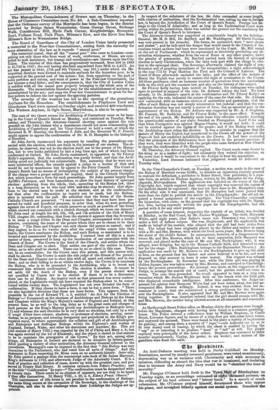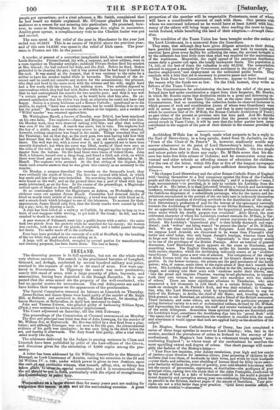Zbe frobintes.
An Anti-Defence meeting was held in Derby Guildhall on Monday. Resolutions, moved by sundry reverend gentlemen, were voted unanimously, deprecating war as at variance with Christianity and with economy in taxation, ridiculing as absurd the idea that war is imminent, and declaring that to increase the Army and Navy would be to "obstruct the tone of morality." Mr. Feargus O'Connor held forth in the Tow!! 10 elf Birmingham on Tuesday night, to an assemblage estimated at eight 'thousand persons, on the subject of his land scheme and " labour bank." In a speech of much vehemence, Mr. O'Connor praised himself, denounced those who oppose his plans, and inveighed bitterly against our social system. Somehow the
people got uproarious; and a rival schemer, a Mr. Smith, complained that he had heard no details explained. Mr. O'Connor pleaded his immense audience as a reason for not entering into particulars. He promised, how- ever, to come to Birmingham for the purpose five nights in succession. Amidst great uproar, a complimentary vote to the Chartist leader was put and carried.
The sum spent in the relief of the poor in Manchester in the year just ended was 43,3211. This is an excess of 18,6551. above the previous year; and of this sum 14,6521. was spent in the relief of Irish cases. The poor- rates in Preston are 12a. in the pound.
A murder, at present of a somewhat inexplicable kind, has been committed at Leeds Barracks. Private Garrad, his wife, a sergeant, and other soldiers, were in a room together on Thursday sennight; suddenly Private Stokes fired his musket at Mrs. Garrad; the ball entered her body, and she died. Before he fired, Stokes pretended to be cleaning the gun; but it was proved that he had kept it loaded in the rack. It was stated at the inquest, that it was contrary to the rules for a soldier to have his musket loaded while in barracks. The husband of the de- ceased said he could not conceive any motive for the assassination; the prisoner, who slept and lived in the same room with the witness and his wife, might have had a few words with the woman, but nothing more. Two soldiers deposed to conversations which they had had with Stokes while he was in custody: he avowed that he had contemplated the murder for two months past; and that it was well "a certain person' was on furlough, or he would have shot him also. He ex- pressed satisfaction that his victim was dead, as otherwise he could not have died happy. Stokes is a young Irishman and a Roman Catholic: questioned as to his motive, he replied, "there was a certain reason, but he would divulge it to no one but the priest." He made no remarks or defence at the inquest; and a verdict of " Wilful murder" was returned against him.
Mr. Walsingham Hazell, a farmer of Hendry, near Bris'ol, has been murdered on his own farm. Two nephews—James and Benjamin Hazell—lived with him. On Monday week, they were observed talking with him; and after that nothing was seen of the old man. A search was made, but in vain. The nephews had the key of a stable, and they were very averse to giving it up: when searched, however, nothing suspicions was found in the stable. Things remained thus till the Thursday; but on that day, as the story goes, two men having told how they had dreamt that the body of Mr. Hazen was in an old well, search was made there. The well was dry, with a cover over it, and it appeared not to have been recently disturbed; bat when the cover was lifted, marks of blood were seen on the aides of the well; and at length the labourers dragged up the corpse of their master from the bottom. On the head there were traces of violent blows. John Hall, a labourer turned over a dung-heap, and found a thick ash stick, on which there were blood and grey hairs; he also found an umbrella belonging to Mr. Hazell. The nephews were arrested. At the first Bitting of the inquest, Hall made such evasive answers that he was given into custody as an accessory to the murder.
On Monday, a surgeon described the wounds on the deceased's bead; they were evidently the result of blows. The face was covered with blood, in which hay-seeds and.hits of hay were imbedded. On searching the stable, spots of blood were found on the wall; and on the ground there was a pool of blood with hay- seed's intermixed, as on the face. In the course of the proceedings, a Magistrate notified spots of blood on James Hazell's trousers.
At an examination before the Magistrates at Ashton, oirWedneedey, strong evidence came out against James Hazell. Constables had detected marks of blood on nearly every article of his clothing; a towel was found with blood on it, and a amock-frock which belonged to one of the labourers. To account for these appearances, James Hazen said, first, that the bloody marks were caused by kill- ing a pig; next, by drawing a lamb. A man has been killed on a railway at Carlisle, by attempting to leap on to a train of coal-waggons while moving, to get hold of the break: he fell, and was crushed to death in an instant.
A poor woman of Falmouth went into a public-house with a sailor: the sailor took two pistols from his pockets while he searched for his money; the woman was curious, took up one of the pistols, it exploded, and a bullet passed through her brain. The sailor made off in the confusion.
Four boys have perished in the reservoir of a mill at Bradford, by the breaking of the ice while they and others were sliding on it. A large mill at Huddersfield, occupied by several parties for manufacturing and dressing purposes, has been burnt down. The loss is heavy.























 Previous page
Previous page